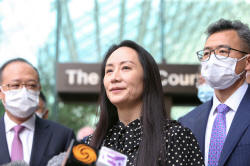Analysis-Huawei CFO's admissions won't help U.S. in its case against the
company -legal experts
 Send a link to a friend
Send a link to a friend
 [September 28, 2021] By
Karen Freifeld [September 28, 2021] By
Karen Freifeld
(Reuters) - The admission by Huawei's chief
financial officer that she misled a bank about the company's business
dealings in Iran likely won't help the United States as it continues to
prosecute Huawei for the same charges.
While Meng Wanzhou's admissions last week
https://www.reuters.com/
technology/
huawei-cfo-meng-appear-court-expected-reach-agreement-with-us-source-2021-09-24
go to the heart of the financial fraud charges, legal experts say it
will be difficult and perhaps impossible for prosecutors to use them
against Huawei Technologies Co Ltd at trial.
And if the government were to try to use her admissions as leverage in
any negotiations aimed at avoiding a trial, experts said, Huawei would
likely say what she admitted was the result of extortion, or even a
fabrication.
A spokesman for the U.S. Attorney's office in Brooklyn declined to
comment, as did a Huawei spokeswoman.

A U.S. judge in Brooklyn on Friday accepted a deferred prosecution
agreement between Meng and U.S. prosecutors to end the case against her.
Meng appeared via video from Canada, where she had been fighting
extradition since her arrest in 2018 on a U.S. warrant.
Meng's arrest was a key source of discord between Beijing and Washington
https://www.reuters.com/world/
china/white-house-xi-raised-case-huawei-cfo-recent-call-with-biden-2021-09-27,
and also had repercussions for Canada. Within hours of the U.S.
agreement and Meng's release, two Canadians who were detained shortly
after Meng was taken into custody were freed from Chinese jails and
flown home.
As part of the agreement, Meng acknowledged that Huawei controlled a
company that operated in Iran, that its employees were Huawei employees,
and that she had made false statements about the company at a 2013
meeting with an executive at a global bank, earlier reported as HSBC
Holdings PLC.
CROSS-EXAMINATION
The statement of facts laid out in the agreement could be seen as an
admission by a high-level officer of Huawei, said Roland Riopelle, a New
York white-collar defense lawyer not involved in Meng's case, "but if
she is not available for cross-examination, it is almost certainly not
admissible."
Meng
https://www.reuters.com/business/
huawei-heir-apparent-prepares-life-after-three-years-canada-court-battle-2021-09-24
flew home to China on Friday and is unlikely to return to the United
States to help the government in its case against the company founded by
her father, Ren Zhengfei.
[to top of second column] |

Huawei Technologies Chief Financial Officer Meng Wanzhou speaks to
media outside the B.C. Supreme Court following a hearing about her
release in Vancouver, British Columbia, Canada September 24, 2021.
REUTERS/Jesse Winter

In other cases, prosecutors typically call individuals like Meng to the witness
stand to testify about their agreements with the government. But if Meng does
not appear in court, Huawei cannot exercise its right to confront her as
provided by the 6th Amendment of the U.S. Constitution. "If she does not come
back, and no one has the opportunity to cross-examine her, it is inadmissible,"
said Charles Stillman, another New York defense lawyer.
The statement of facts identified Skycom Tech Co Ltd as a Hong Kong company that
operated in Iran but was controlled by Huawei. It noted that Skycom was not a
business partner, as Meng had claimed, and that Meng had falsely stated Huawei
operated in compliance with applicable laws, regulations and sanctions.
Prosecutors said the deception by Meng and colleagues was intended to obtain
banking services from global financial institutions in violation of U.S.
sanctions against Iran.
The statement of facts also could be raised by the U.S. Department of Justice in
talks with the company's lawyers in an effort to avoid trial, experts said, even
if it would not be allowed in as evidence.Washington lawyer Juan Morillo, who
often handles high-profile white collar and cross-border cases, said it "gives
them some additional leverage in negotiations with Huawei."
But Morillo said the company could argue Meng's agreement was also the "product
of extortion" because she may have felt forced to sign it to gain her freedom.
So ultimately, he said, the value would be minimal.
Huawei can also note that it did not sign the agreement and is not bound by it.
In fact, a Chinese foreign ministry spokesperson on Saturday said "the so-called
'fraud' charges against" Meng were "purely fabricated." "I've been in cases
similar to this, and that's what the strategy is going to be with Huawei," said
Morillo. "They'll say, 'This is a fabrication. This is the product of extortion
and it has no binding effect on us at all.'"

Huawei faces wire fraud, bank fraud and conspiracy charges that included Meng.
It also faces other charges, including for violating sanctions on Iran,
obstructing justice, and conspiring to steal trade secrets from U.S. technology
companies. It has pleaded not guilty.
(Reporting by Karen Freifeld in New York; editing by Chris Sanders and Lincoln
Feast)
[© 2021 Thomson Reuters. All rights
reserved.] Copyright 2021 Reuters. All rights reserved. This material may not be published,
broadcast, rewritten or redistributed.
Thompson Reuters is solely responsible for this content. |